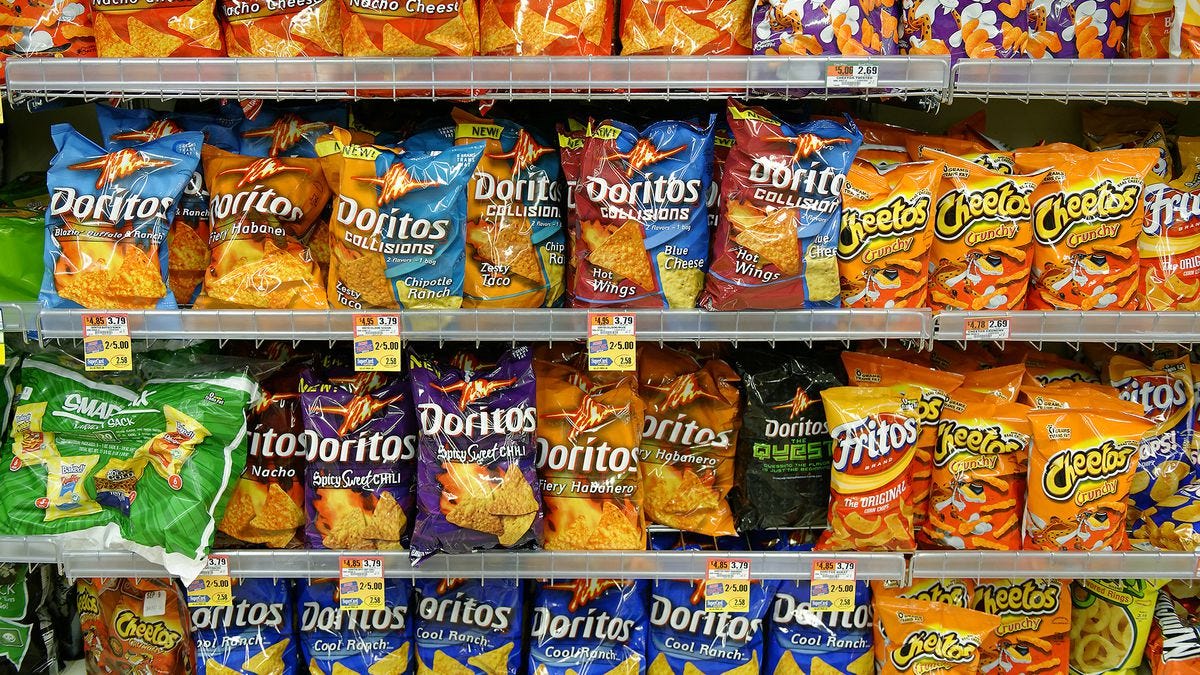🍫 The inconvenient truth about ultra-processed foods

Health: For at least 1.8 million years, humans have been drying, fermenting, and roasting food in order to make perishable items more resistant to environmental factors. While processing itself is not a problem, a new form of industrial preservation has emerged to produce more durable nutrients. Ultra-processed foods (UPFs), which depend on chemical additives and mechanical techniques, now dominate grocery shelves because they are highly convenient, hyper-palatable, and aggressively marketed. However, a growing body of evidence points to a lethal connection between UPF consumption and increased risks of obesity, heart disease, type-2 diabetes, and cancer. In 2019, A landmark study carried out by the National Institute of Health found that America’s obesity epidemic could be driven primarily by UPFs’ poor nutritional profile.
The issue with UPFs - including soda, sugary bread, chips, candy, and ice cream - is that they depend on cheap ingredients combined with unnatural inputs that disrupt our gut bacteria. The color, flavor, aroma, and mouthfeel of a processed product are engineered to be ultra-tasty and even addictive in humans. The bright red powder coating each and every Dorito is high in salt, sugar, flavor-boosters like MSG, and acids (buttermilk solids, lactic acid, and citric acid) that strategically trigger the release of saliva.
In light of the clear evidence that industrially processed foods pose risks to the health of humans, the worldwide sale of UPF continues to rise rapidly - especially in middle-income countries like China, South Africa, and Brazil. In the US, according to data from over 9,000 people who participated in a nationally representative survey, 57.9 percent of American’s calorie intake was derived from UPFs (between 2007 and 2012). Rising consumption reflects “Big Food’s” ability to undermine public health policies.
Corporations like McDonald’s, Coca-Cola, and Nestlé shell out millions of dollars every year to make political donations and fund favorable research in an effort to drive UPF consumption globally. In 2018 and early 2019, Mars Incorporated - the maker of Snickers, M&Ms, and Skittles - spent over $2 million lobbying Congress around the federal government’s nutrition advice. Right now, the only way to be sure the food you purchase is minimally processed is by investing in locally sourced ingredients or seeking out the USDA’s certified organic and the Non-GMO Project‘s GMO-free label. Thinking long-term, it is time for US consumers to follow in Brazil’s footsteps by advocating for the taxation of UPFs and for dietary guidelines that advise shoppers to avoid these products on the grocery shelves.
Listen: In this episode of Doctor’s Farmacy, Dr. Hyman and Dr. Shebani Sethi Dali sit down to discuss “metabolic psychiatry,” a new term that takes into consideration the topic of food and metabolic disruption in the evaluation and treatment of mental health conditions. In 2017, one in five U.S. adults (46.6 million) struggled with a mental illness. The rise in psychiatric illness correlates with increases in metabolic abnormalities - e.g. insulin resistance, pre-diabetes, and obesity. To combat inflammation and oxidative stress, which are considered the root causes of many illnesses - such as depression, anxiety, bipolar disorder, and more - Dr. Sethi Dalai stresses the importance of a diet low in sugar, processed foods, and refined carbohydrates.
Eat: Bluebird Grain Farms is a family-run business that sells 100% certified organic ancient grains, fresh-milled flour, and whole-grain handcrafted blends. The small team sows, grows, harvests, and sun-cures their grains, and mills them to order on their farm in northern Washington. All of Bluebird’s grain farmers focus on regenerative practices such as planting cover crops that build organic matter, timing tillage for optimum seed germination and natural weed control, and incorporating grain straw back into the soil after harvest. You can find their full line of products for sale online.
Thanks for listening to us! Don’t forget to share this week’s harvest with your friends.
The Regeneration is brought to you by PastureMap | Soilworks | Wholesome Meats.


